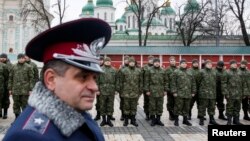As Western leaders step up their efforts to find a diplomatic solution to the crisis in eastern Ukraine, one analyst says any peace deal must include the proviso that the Ukrainian government has to deal with separatist leaders.
“As absolutely distasteful as that notion is - that these entities have come to existence through force, that they have been imposed on Ukraine by the Russians - the Ukrainians will have to live with that,” said Matthew Rojansky, a Russia expert with the Washington-based Wilson Center.
The current diplomatic push comes as fighting has intensified in eastern Ukraine where Russian separatists are battling Ukrainian government forces. In the past two weeks, separatists launched a new offensive.
“They successfully took a lot of territory, including the airport in Donetsk,” Rojansky said. “They have more or less surrounded Debaltseve, which is a transportation hub where the railroads come in and then split off to serve up and down what is currently the front. So it’s a critical location.”
In an effort to find a peaceful solution, French President François Hollande and German Chancellor Angela Merkel have a plan they are presenting to Ukrainian and Russian leaders. No details of the plan have been released.
Providing Arms to Kyiv
As the fighting in eastern Ukraine intensifies, the United States is debating whether or not to provide Kyiv with lethal defensive weapons. Up to now, the European Union and Washington have provided the Ukrainians with non-lethal arms such as night vision goggles, flak jackets and medical supplies.
Washington and European Union states say Russia has provided the separatists with military equipment and men - a charge denied by Moscow.
During his Senate confirmation hearings to become U.S. Defense Secretary, Ashton Carter said he would “very much incline” toward supplying weapons.
But Matthew Rojansky is against providing lethal weapons to Ukraine.
“It’s a mistake for a whole lot of reasons, principally that there isn’t a scenario no matter what the Ukrainians are armed with whereby they defeat these Russian-backed forces,” he said.
Rojansky said there simply won’t be enough weapons to defeat the separatists.
“And the argument about simply imposing more costs on Russia, sending more bodies home to try to change Putin’s calculus, I think misunderstands where the Russians are coming from,” he said. “I think that will not only strengthen Putin’s resolve but it will give him the perfect propaganda coup that he has always needed, which is to transform this from a tragic and misguided Russian intervention in a neighboring, brotherly, Slavic country, into a Russian defensive war against American aggression, which is something that will be eternally popular with the Russian population and for which they would be prepared to sacrifice.”
Russia's Tolerance
Rojansky said Russia is willing to sustain heavy losses.
“The notion that there is some abstract level of casualties which would be unacceptable to them - it’s the same mistake that we and many others in the world always make, in which we project our values unto them," he said. "Ten-thousand Russian bodies isn’t going to do it. Maybe 25 million - but we don’t want to get into that math, right?”
The Russia expert said if Washington provides Kyiv with lethal weapons, “it will be something token and symbolic, that will arrive little and late, that will not in any way shift the balance of power because it can’t. But it will nonetheless strengthen political forces in Kyiv who want to keep fighting.”
In an effort to force President Vladimir Putin to change course, Washington and the European Union have imposed economic and financial sanctions against Moscow.
Rojansky admitted sanctions are not “changing Putin’s behavior and they are not weakening the regime. But they are sending an extremely powerful moral message. They are sending a message to everyone else in the world who might consider taking territory by force, breaking the rules of international order and so on.”





